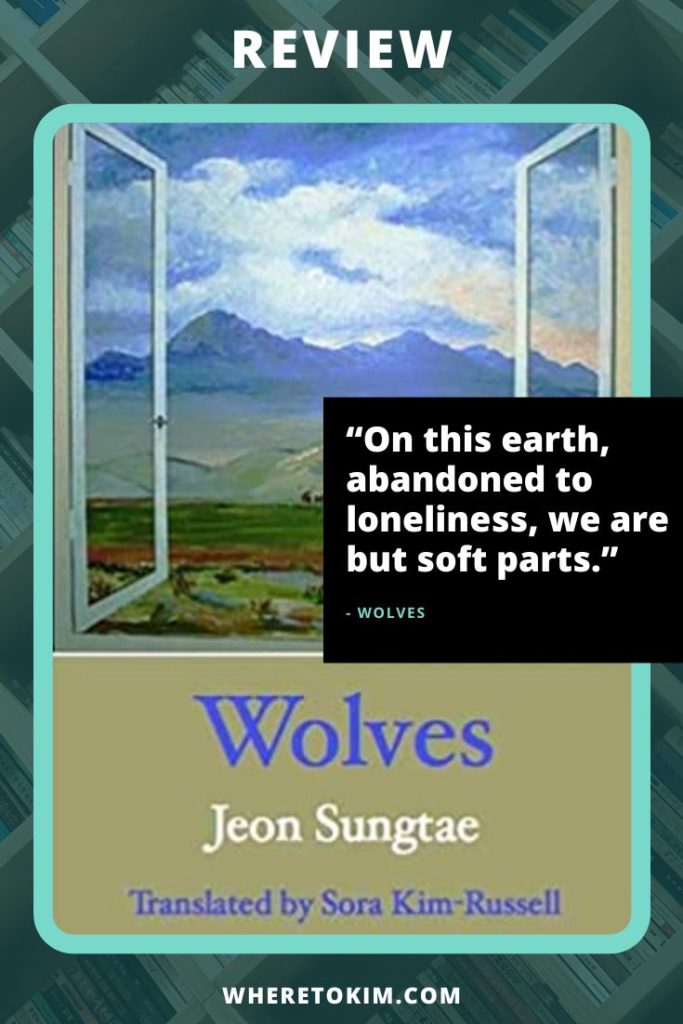The stories in Wolves by Jeon Sungtae are about change that happens to you and change that you desire.
Location: Ulan Bator and other places in Mongolia, Cheongsan island and villages near Goheung (where the author was born) in the south of South Korea
Wolves synopsis
Six of the ten stories in Wolves are centered in Mongolia, which lies on the border between civilization and wilderness, the present and the past. Mongolia is presented not as an exotic tourist destination but as a forceful suggestion for changing one’s life. “Mongolia gave me extraordinary pain and inspiration,” author Jeon Sungtae says. “The loneliness I confronted on those vast plains, still preserved in their original state, lingered in me as if I had returned from beyond the edge of the world.”
Book review
All societies change over time. Sometimes people change with them, and sometimes change happens to people who are unable to make the change they want. If Wolves were set in another part of the world, the stories would look very different, but the essence would remain: what behavior do you expect from others and from yourself?
P(l)ain of loneliness
The stories in Wolves are reminiscent of a campfire setting. Jeon Sungtae is a good storyteller and knows how to captivate an audience. He sets the scene in such a way that you immediately feel the mood of those involved. The intensity of human suffering increases with each story until the climax in the story River Crossers.
The first story, The Magnolia, is a well-chosen opening story that takes you to a restaurant in Ulan Bator. It is a place where the two Koreas meet, and where politics and prejudice still get in the way of simply enjoying a meal and being grateful that such a restaurant can exist. This story is followed by the melancholic Wolves after which the book is named. The end of the nomadic lifestyle after the introduction of a capitalist economy is not what the small cast of characters with distinctive voices called for. Through this story, we get the same taste of nomadic life as those who go on the nomadic lifestyle-inspired management retreat mentioned in the story.
Life simmers away
The narrator in Korean Soldier could use such a retreat, as he feels the pressure to live up to his own identity. Fortunately, there are good people out there who offer a helping hand. Even when you think your good will is in vain, people can surprise you in a positive way with their morals and give you your brain’s equivalent of beautiful Chinese fireworks.
Sometimes society gets in the way of the change you want (Southern Plants) and at other times the question arises as to what keeps you from getting a second chance when society doesn’t get in the way (Second Waltz).
The last three stories are set in southern South Korea and have a different – simmering rather than acute suffering – atmosphere. They are set in the countryside and show what life was like for the elderly – in this case, someone with ties to North Korea (Has anyone seen my shoes), the poor (Kids need money too) and those who look different in a mostly homogeneous country (Imitayshun).
Recommendation
Wolves is worth reading because of author Jeon Sungtae’s good storytelling skills that have been preserved (or perhaps even improved) in the translation. The stories are about change that happens to you and change that you desire. For me, the stories are a reminder that you cannot understand someone’s motivations unless you know more about them. What constitutes good human behavior may be different for everyone.
The stories are not very memorable. But when I reread the one sentence story descriptions that I shared with you above, I am reminded of the takeaway I have from each story and the way I felt at a certain point in that story.
Interested?
Buy your copy of Wolves from Amazon.
Book details
Title: Wolves
Author: Jeon Sungtae
Translator (from Korean): Sora Kim-Russell
Language: English
Publisher: White Pine Press
Pages: 220
ISBN (13): 9781945680014
Publication date: 16 May 2017
About the author and translator
Jeon Sungtae was born in 1969 in Goheung, South Jeolla Province, and studied creative writing at Chung-Ang University. His published works include the short story collections Second Self-Portrait, Wolves, Over the Border, and Burying Incense; the novel The Female Barber; and the book fo essays Big Brothers of the World. His work has appeared in translation in New Writing from Korea, vol. 2, Azalea: Journal of Korean Literature & Culture, and Banipal.
Sora Kim-Russell has translated Gong Ji-young’s Our Happy Times (Short Books, 2014) and Shin Kyung-sook’s I’ll Be Right There (Other Press, 2014), Bae Suah’s Nowhere To Be Found (AmazonCrossing, 2015), and Hwang Sok-yong’s Princess Bari (Periscope, 2015).







